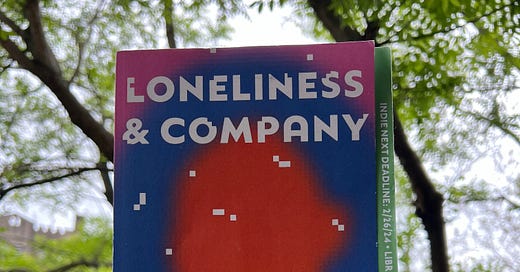Sunday Reads Interview Series: Writer Charlee Dyroff on How She Published Her First Book
Dyroff's debut novel was published this week.
Welcome back to the Sunday Reads interview series. These conversations are a super selfish way for me to indulge my desire to speak to women I admire about how they pursue their dreams. Suggestions for women I should interview next? I’m all ears.
This series is for paid subscribers, but if you cannot foot a subscription email me and it will be comped.
Today I bring you a conversation with novelist Charlee Dyroff, whose debut book Loneliness & Company came out last week. Charlee and I did our MFA together, and since the book publishing process is so opaque (and there are so many writers in the Sunday Reads readership) I asked if she’d be willing to share how she went from a non-fiction MFA student to a published fiction writer, and she graciously obliged.
Loneliness & Company is a page-turner, about a woman in a somewhat dystopian future version of New York City who is working on an artificial intelligence tool to combat loneliness. I couldn’t put it down.
Here’s my chat with Charlee.
We’ll start with the cliche question but I really want to know—where did this idea come from?
I worked in tech and I was thinking a lot about how we engage with technology, and how the things we create end up creating us as well. I remember having a conversation with some co-workers, a lot of them were engineers, and they were talking about artificial intelligence and this idea that to create human-like tech, you first need to understand what it means to be human. It was just a happy hour conversation but it really stuck in my head. This was years before I began writing.
Sometimes you don't even get to really control what you're writing, it sort of swirls around and all of a sudden you can't stop thinking about it. The loneliness aspect didn't come until two drafts into the manuscript which is interesting because it feels so integral to it now.
In grad school I had a professor, Wendy Walters, who was reading a lot of my essays, and she very kindly pointed out that the narrator of the essays, aka me, was, like, extremely isolated. I was teaching, I was in grad school and I was living alone, and it was right before the pandemic, and I was really lonely, and couldn't really admit it to anyone because I was so busy and I have a lot of friends and I didn't know why I was feeling what I was feeling. For some reason, it was coming up in my essays, so when she pointed that out, I was like, oh, this is upsetting, but she's right. So I started thinking about loneliness, why we can't talk about it or don't want to talk about it, and why it can appear in people, even if you think you have no reason for it. That’s when that started to come into the fiction as well.
When you were writing those essays, did a version of this manuscript exist?
It did. I started experimenting with fiction to escape non-fiction because I had a hard time sometimes in the MFA workshops. I felt a lot of pressure. I felt like I wasn't writing something that resonated with people. My essays were maybe not what people wanted to read at an MFA program. I still love writing essays, and I think I want to keep doing essays and non-fiction, but I do remember turning to fiction as sort of this escape. It was something I could write without having to turn it in.
I refused to call this a book until I had a full manuscript, because I was afraid of if I give this a name, if I talk about it openly, then it lets the world in and it's not just this creative project that can become whatever it wants to become and be as weird as it wants to be.
After you finished your manuscript, then what happened? How did you land an agent?






